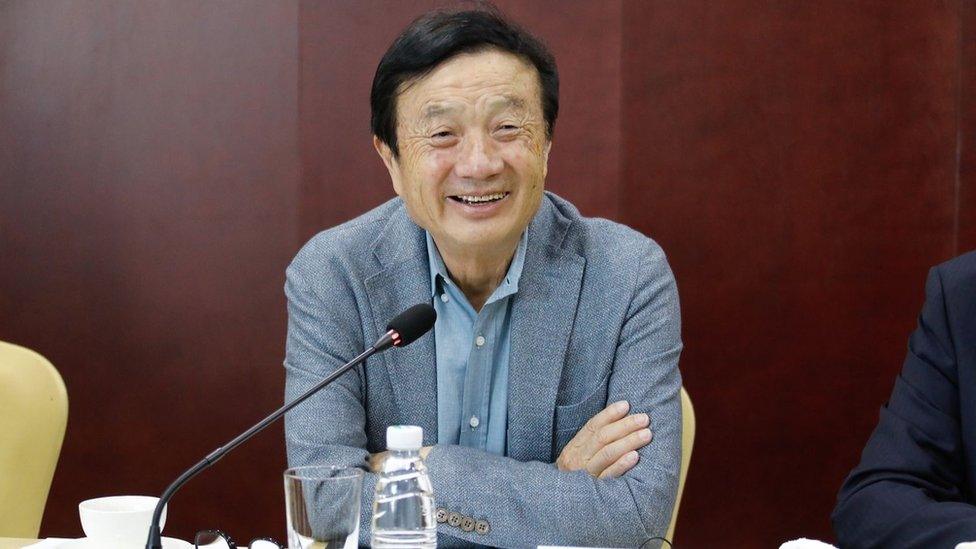Huawei boss hopes for better relations with US
- Published

Huawei CEO Ren Zhengfei
Huawei’s founder Ren Zhengfei said he hopes the new US administration will take a softer approach towards the Chinese telecoms giant.
However, he doesn’t expect much to change over the short-term.
Mr Ren's comments come as he challenges the Federal Communications Commission’s designation of Huawei as a threat to national security.
The company has long denied US claims that its equipment could be used for spying.
Huawei is one of a handful of Chinese tech firms that were targeted by former US president Donald Trump on the grounds of national security.
US government sanctions have stopped Huawei from accessing vital chipsets, a move which has hurt the company's handset business.
Huawei has also been locked out of the development of 5G in a number of countries, including the UK.
Open trade
Mr Ren expressed hope for a new approach from US policymakers, saying a more open trade relationship would benefit both the US and Huawei.
“I hope the new US administration will come up with more open policies that are in the interests of US companies and the US economy as a whole,” he said.
However, he appeared to think little would change over the short-term, despite the change of administration in Washington.
The culture secretary says providers must remove all of Huawei's 5G kit from their networks by 2027.
Huawei is currently on the US Department of Commerce’s Entity List, which restricts its access to items produced with US technology and software.
“I think it's very unlikely that the US will remove us from the Entity List. I won't say it's impossible, but it's extremely unlikely,” Mr Ren said.
Mr Ren’s comments come as Huawei files a legal challenge against designating Huawei as a security threat.

China hopes for a reset in a post-Trump world
These are the first comments from a major Chinese company on the US-China spat in a post-Trump world.
They highlight just how much China Inc is hoping for a reset of US-China relations in a Biden era.
There's possibly no greater symbol of that rivalry than Ren Zhengfei, founder of Huawei.
Huawei has consistently denied allegations of being a national security threat and it was no different this time.
But while the Chinese firm appeared to extend an olive branch to the new American president, there was also a distinct warning to the US: trying to keep China down won't work.
Mr Ren - who is famously fond of historical references to drive home his points - warned the US risks repeating the same mistake the UK did, when "in the mid-18th century the UK adopted a closed-off policy towards the US, which pushed the US to rise as the most powerful country in the world."
The Huawei boss says blocking Huawei and China could lead to "an unexpected outcome."
But Mr Ren was also conciliatory - and said he hoped for more open policies towards Chinese companies in a new Biden era, saying this would help American companies and the US economy.
Other Chinese firms have also appealed to the new administration.
Last month, Chinese telecoms firms asked the New York stock exchange to rethink their planned delisting, in the latest back and forth about whether they should be allowed to trade in the US.
It's hard to see how those appeals will be granted.

Critical tone
So far, President Biden's nominees for top economic and diplomatic posts have indicated that his administration will continue to take a tough line on China.
His pick as budget director Neera Tanden was critical of China at her confirmation hearings on Tuesday.
Ms Tanden told senators "It is important that we marshal allies to put pressure on China to ensure that they have a fair trading system where American companies can truly compete against China."
She also told the committee she shared concerns about threats to US supply lines posed by Chinese products, including Huawei’s.